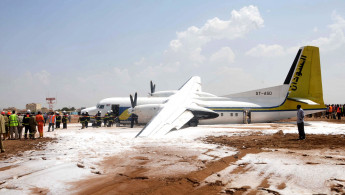Yearning to fly: Sudan Airways plans revival of grounded fleet after decades of US sanctions
The American embargo on Sudan had made it impossible for the state-owned carrier to procure spare parts or purchase new aircraft in the last 20 years, leading to immense safety implications for the airline and forcing it to ground 12 out of 14 of its airplanes.
"One by one all our planes stopped flying until the entire fleet was grounded because we were unable to get spare parts," Transport Minister Makkawi Mohamed Awad told AFP earlier this week.
"You go to Khartoum airport and you will find all our planes parked."
Washington imposed the sanctions over Khartoum's alleged support for Islamist militant groups. Osama bin Laden, the slain al-Qaeda founder, lived in Sudan between 1992 and 1996.
The sanctions had put restrictions on international banking transactions, exchange of technology and spare parts. Combined with other cumbersome trade regulations, they hampered Sudan's economic growth, especially sectors such as transport.
"We expect our cooperation with Boeing and Airbus to resume as we had excellent relations with them before the sanctions," Awad said.
|
Insider sources say Sudan Airways, one of the oldest airlines in Africa, is conducting a review to determine the fate of the grounded planes and whether they can be made airworthy again by procuring new components.
The top US envoy in Khartoum, Steven Koutsis, told reporters on Saturday that the US Department of Commerce had already addressed the issue of spares that Sudanese airlines or the country's railways need.
"Only a few parts that have what we call dual use technology will remain prohibited," he told reporters.
 |
Sudan Airways' collapse began when the company sacked 20% of its staff in 2003, who included hard to replace top technicians |  |
'Corruption and mismanagement'
The sanctions were not the only reason for Sudan Airways' troubles, however. According to experts who spoke to The New Arab, corruption, mismanagement and a controversial move to make redundant a large segment of highly skilled personnel were also to blame.
"Sudan Airways was hit hard by the US embargo, so it tried to procure French- and German-made Airbus planes," says Mortada Hassan Jomaa, aviation expert.
However, he added, this effort did not continue, blaming the constant changes at the top in the national carrier, which he said had an adverse impact. Many of these administrators were hired for political reasons and had no suitable aviation background, he explained.
"Sudan Airways' collapse began when the company sacked 20 percent of its staff in 2003, who included hard to replace top technicians," Fathi Taha, former director of engineering at the carrier, told The New Arab.
"By 2004, the US embargo had little effect... until that year, the company's aircraft were registered in France and it had an alliance with Airbus and Lufthansa that enabled it to overcome the sanctions," he added.
|
With the lifting of the sanctions, Sudan Airways is optimistic that the airline will also be able to resume flying international routes, including to Europe.
"Sudan Airways still owns air slots to Europe, Asia and Africa. We can get our operating licences back now that the sanctions have been lifted," said the transport minister.
Other Sudanese aviation officials do not share the minister's optimism.
"It will be difficult for the company to resume its alliances with international airlines because of its difficult financial and technical situation," said Mutaz Abdul-Latif, former director of air cargo at the airline.
"The only solution is full government support," he added.
Yet with the lifting of the sanctions, Sudan is expected to become "at least moderately more attractive to Western investors, particularly companies eager to enter a region where countries like China, Malaysia and India are already present," a report in the New York Times said last week.
Hamad al-Nil Youssuf, former director of Sudan Airways, agrees.
"It will be easy to deal with US banks to finance the purchase of new airplanes as well as spare parts," he told The New Arab.
"I predict a prosperous future for Sudan Airways, with its fleet likely to expand to 80 aircraft after the sanctions."



